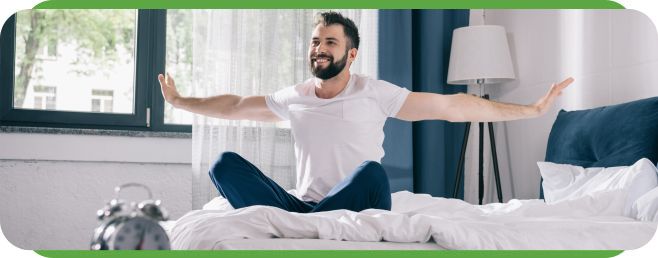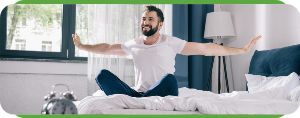How Do I Prepare Myself for a Sleep Study?
Learn about our convenient and cost-effective at-home sleep study options for diagnosing obstructive sleep apnea (OSA). Find out how to prepare for your test, how many hours of sleep are required, and how the AHI score is used to determine sleep apnea severity. Koala® Center For Sleep & TMJ Disorders offers at-home sleep study from the comfort of your home. For more information, contact us or book an appointment online. We have convenient locations across the U.S. in Bloomington IL, Peoria/Dunlap IL, El Paso TX, and Wausau WI.




Table of Contents:
Is an at-home sleep study accurate?
How many hours of sleep do you need for a home sleep study?
How to prepare for a sleep study?
What not to do during an at-home sleep study?
What is a bad sleep study score?
While polysomnography, or in-lab sleep studies, provides the most accurate diagnostic results, at-home sleep studies still deliver valuable insights into sleep patterns and potential disorders. At-home sleep studies are the most convenient and cost-effective approach to diagnosing obstructive sleep apnea (OSA).
The accuracy of at-home sleep studies depends on various factors, including the type of sleep disorder being investigated and the specific technology used. For example, in cases of complex sleep disorders, more comprehensive monitoring is required for diagnosis than an at-home sleep test can offer.
In summary, while both approaches offer their own advantages, the choice between at-home and in-lab sleep studies should be made in consultation with a sleep specialist. The expert can assess your circumstances and recommend the most appropriate diagnostic approach based on your specific symptoms.
A minimum of four hours of sleep is needed for an at-home sleep study. The longer you sleep, the more useful data can be gathered. So, it’s optimal to sleep for as long as possible.
In some cases, more than one night of sleep needs to be recorded for an accurate diagnosis to be made. This can occur due to various reasons, such as the condition suspected and whether enough data was gathered on the initial night.
Before your at-home sleep study, the specialist will provide you with detailed instructions to ensure the data is collected accurately. It’s important to follow these directions carefully to prepare for your sleep study properly.
It’s essential to keep several things in mind as you prepare for your at-home sleep study:
– Create a comfortable sleep environment – By keeping your bedroom cool, dark, and comfortable, you can enhance the success of your sleep study.
– Avoid napping – To prevent sleeplessness during the night, you should avoid napping on the day of your sleep study.
– Avoid caffeine – Caffeine is a stimulant that interferes with sleep patterns. To ensure your sleep study is successful, it’s suggested that you limit caffeine or avoid it completely that day.
– Avoid alcohol or other sedatives – As they can negatively impact your sleep patterns and the results of your at-home sleep study, you should avoid alcohol and other sedatives unless otherwise prescribed by your doctor.
In addition to the above steps, you should follow your normal routine as much as possible. This will ensure that the results of the test represent your normal sleep patterns.
It’s crucial to be diligent on the day of your sleep study by avoiding certain things. You should avoid caffeine, alcohol, and other substances that could interfere with the quality of your sleep. If you take medications, it’s important to communicate with the sleep specialist beforehand. In certain cases, you will be asked to skip your medication, as it could affect the results. In addition, you should avoid heavy meals before bed, as this can make it difficult to fall or stay asleep. Napping throughout the day can also affect your sleep quality, so you should avoid it on the day of the sleep study.
At-home sleep studies measure breathing to assist in the diagnosis of sleep apnea. The test focuses on how many apnea or hypopnea episodes occur during the night. The apnea-hypopnea index (AHI) is used to measure the results.
Normal test results show few or no apnea or hypopnea episodes. A score of less than 5 is considered normal. If you score a 5 or higher on the AHI, it means you have sleep apnea. A score of 5 to 14 represents mild sleep apnea. If you scored within the range of 15 to 29, you have moderate sleep apnea. Those with a score of 30 or more on the AHI are diagnosed with severe sleep apnea.
Preparing for a sleep study is an essential step in diagnosing sleep disorders, and knowing what to expect can make the process easier. At Koala® Center For Sleep & TMJ Disorders, we guide you through the preparation process to ensure the best results. First, avoid caffeine or heavy meals before your sleep study, as these can interfere with sleep quality. You should also bring any necessary medications and discuss them with our team.
Wear comfortable clothing and make sure to maintain your usual sleep routine to help you relax during the study. It’s also helpful to prepare questions for our specialists about what to expect during the test and how your results will be interpreted. Our team at Koala® Center For Sleep & TMJ Disorders is here to support you every step of the way, ensuring a smooth and effective sleep study experience. Contact us today for more details on how to prepare! Please contact us today or visit us online to book an appointment. We have convenient locations across the U.S. in Bloomington IL, Peoria/Dunlap IL, El Paso TX and Wausau WI.

Additional Services You May Need
▸ KoalaKIDZzz®
▸ Sleep Apnea
▸ Snoring
▸ TMJ Disorder
▸ Fatigue
▸ Sleep Disorders
▸ Weight Loss
▸ CPAP Alternative
▸ Oral Appliances




